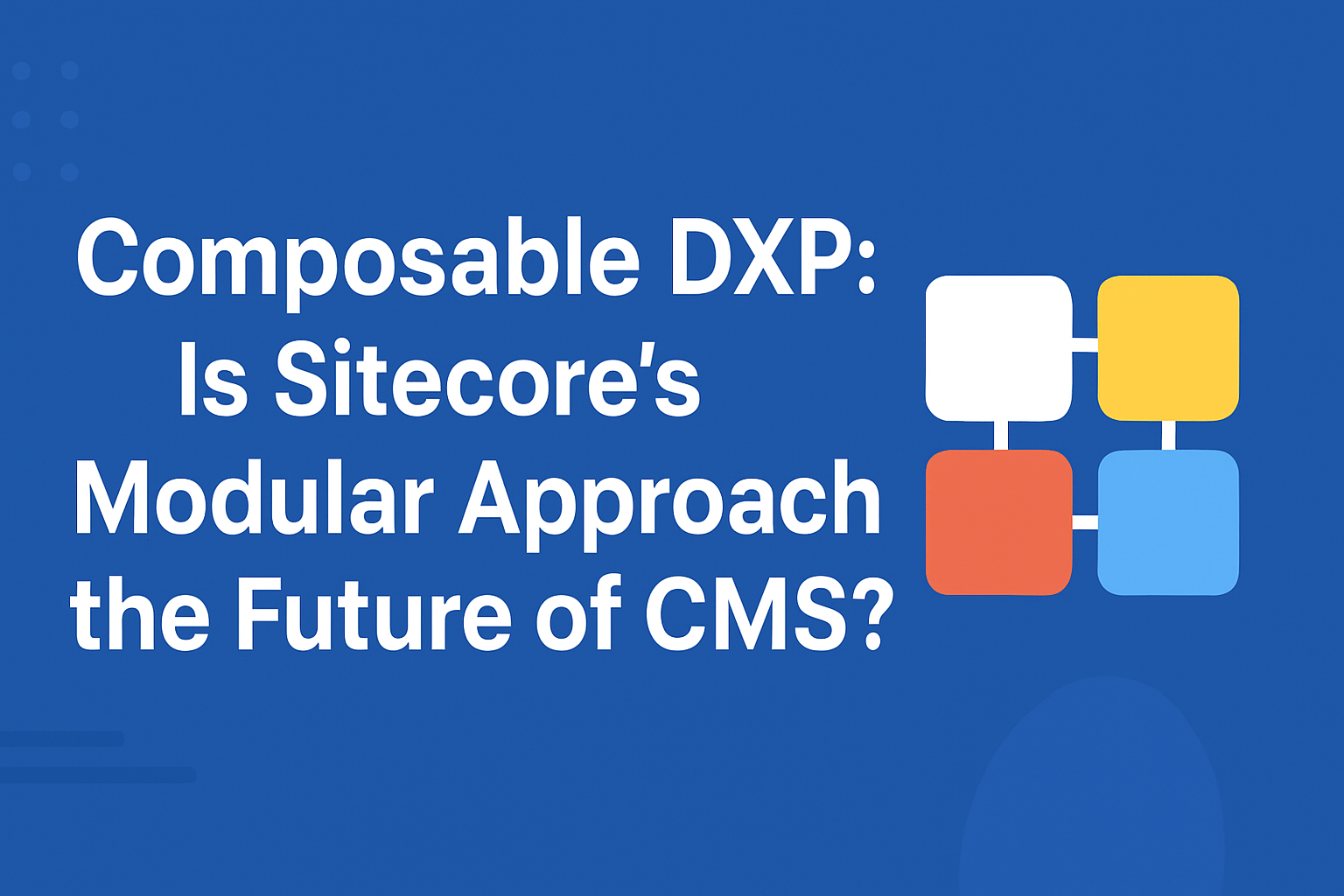Composable DXP: Is Sitecore’s Modular Approach the Future of CMS?

Table of Contents
The digital landscape is evolving at a breakneck pace, and businesses are under immense pressure to deliver personalized, seamless experiences across multiple channels. Traditional content management systems (CMS) have struggled to keep up with these demands, pushing the industry toward more flexible, scalable solutions.
Enter Composable DXP—a modular, API-first digital experience platform that promises agility, innovation, and better customer engagement. In this article, we explore whether Sitecore’s modular approach, through its composable DXP, is indeed the future of CMS.
What Is Composable DXP?
A Composable Digital Experience Platform (DXP) is an innovative approach to managing digital experiences. Unlike traditional monolithic CMS platforms, composable DXPs rely on assembling best-of-breed components—think modular microservices, APIs, and cloud-native technologies—to create a flexible and scalable architecture.
At its core, composable DXP embraces API-first architecture and microservices architecture, allowing enterprises to quickly add, remove, or update features without disrupting the entire system. This is a significant departure from legacy CMS platforms, which often require long development cycles and complex integrations.
In comparison to headless CMS, which decouples content management from presentation layers, composable DXP takes this a step further by integrating various capabilities such as personalization, analytics, and customer data platforms (CDPs) into a unified ecosystem. This ensures a more seamless and personalized omnichannel content delivery experience.
Sitecore’s Modular Approach: Pioneering the Composable DXP Movement
As a leading Sitecore development company, Sitecore has been at the forefront of this composable revolution. Its modular approach is embodied in the Sitecore Composable DXP, which leverages Packaged Business Capabilities (PBCs)—independent, reusable services that businesses can combine to meet specific needs.
Sitecore’s composable platform is also built with a cloud-native CMS architecture, allowing for scalable, on-demand resources in the cloud. This enables organizations to leverage the benefits of SaaS CMS models, such as reduced infrastructure costs, automatic updates, and enhanced security.
For businesses seeking robust digital transformation, Sitecore implementation services ensure smooth adoption and integration of this modular platform. These services, offered by experienced Sitecore partners, help tailor the composable DXP to align with specific business objectives and technical requirements.
Benefits of Composable DXP for Enterprises
Adopting a composable DXP architecture brings numerous advantages for businesses aiming to stay competitive:
1. Agility and Flexibility
A modular CMS allows organizations to respond swiftly to market changes, launch new features faster, and experiment without risking system stability. With composable components, teams can independently develop and deploy capabilities, accelerating innovation cycles.
2. Enhanced Omnichannel Content Delivery
Delivering consistent experiences across websites, mobile apps, social media, IoT devices, and more is critical. Composable DXP’s architecture supports experience management across channels, ensuring customers receive tailored content wherever they engage.
3. Personalization at Scale
With integrated AI-powered tools and personalization in composable platforms, brands can deliver highly targeted content based on customer behavior, preferences, and real-time data. This improves engagement and conversion rates.
4. Reduced Vendor Lock-In
Traditional CMS platforms often tie businesses to a single vendor’s ecosystem. Composable DXP offers the freedom to select best-of-breed tools for DXP stack integration, reducing dependency and increasing future-proofing.
5. Improved Scalability and Performance
Sitecore’s modular approach supports a cloud-native modular stack, enhancing site speed and scalability. APIs facilitate seamless integration with digital asset management (DAM), customer data platforms (CDP), and other enterprise systems.
Comparing Traditional CMS, Headless CMS, and Composable DXP
Understanding the evolution from traditional CMS to composable DXP helps contextualize why this trend is gaining momentum.
| Feature | Traditional CMS | Headless CMS | Composable DXP |
| Architecture | Monolithic | Decoupled content & presentation | Modular microservices & APIs |
| Flexibility | Limited | Moderate | High |
| Personalization | Basic | Limited | Advanced AI-driven personalization |
| Omnichannel Delivery | Partial | Good | Seamless |
| Vendor Lock-In | High | Medium | Low |
| Scalability | Low-Medium | Medium | High |
Businesses looking for flexibility and scalability often find a composable DXP the best fit. However, migrating to this architecture requires planning and expertise—this is where a trusted Sitecore development company and Sitecore implementation services play a crucial role.
Real-World Use Cases and Success Stories
Many enterprises have already embraced composable DXP solutions, especially through Sitecore’s offerings like Sitecore XM Cloud. These organizations have reported improvements in digital experience delivery, faster innovation, and better customer engagement.
For example, integrating digital asset management (DAM) with composable DXPs allows marketing teams to efficiently manage media files while ensuring consistency across channels. Combining this with customer insights from customer data platform (CDP) integrations enables hyper-personalized campaigns.
The Future of CMS: Is Composable DXP the Way Forward?
The digital experience landscape will continue evolving rapidly, influenced by emerging trends such as AI-driven personalization, advanced analytics, and cloud-first strategies.
Sitecore’s modular approach represents a shift toward more adaptive and resilient digital ecosystems. Its ability to combine agility, scalability, and personalization positions it well as the future of CMS.
As enterprises increasingly adopt cloud-native modular stacks, the lines between content management, marketing automation, and customer experience will blur—making composable DXPs not just advantageous but essential.
Conclusion
In today’s fast-changing digital world, businesses must adopt platforms that offer agility, scalability, and personalized experiences. Composable DXP, championed by Sitecore’s modular approach, addresses these needs by combining the flexibility of API-first architecture with powerful personalization and omnichannel capabilities.
Whether you are a business looking to migrate or an enterprise aiming to innovate, engaging with a reliable Sitecore development company and leveraging Sitecore implementation services can help you successfully transition to this future-ready platform.
Ultimately, the question isn’t just if composable DXP is the future of CMS, but how quickly businesses can adapt to reap its benefits.
FAQ’s
Q: What is Composable DXP?
Ans: Composable DXP is a modular, API-first digital experience platform that enables businesses to assemble best-of-breed components like microservices and cloud-native tools to deliver personalized, omnichannel digital experiences.
Q: How does Sitecore support Composable DXP?
Ans: Sitecore offers a modular, composable DXP built on Packaged Business Capabilities (PBCs) and cloud-native architecture, allowing enterprises to customize, scale, and personalize their digital platforms efficiently.
Q: What are the advantages of using Composable DXP over traditional CMS?
Ans: Composable DXP provides greater flexibility, faster innovation, improved omnichannel delivery, AI-powered personalization, and reduces vendor lock-in compared to traditional monolithic CMS platforms.
Q: How can a Sitecore development company help with implementing Composable DXP?
Ans: A specialized Sitecore development company offers expertise in customizing and integrating Sitecore’s modular platform through professional Sitecore implementation services, ensuring a smooth migration and optimal performance.
Q: Is Composable DXP suitable for all types of businesses?
Ans: While a composable DXP offers significant benefits for enterprises requiring flexibility and scalability, businesses should evaluate their specific needs and existing systems before adopting. Consulting with Sitecore experts can help determine the best fit.












